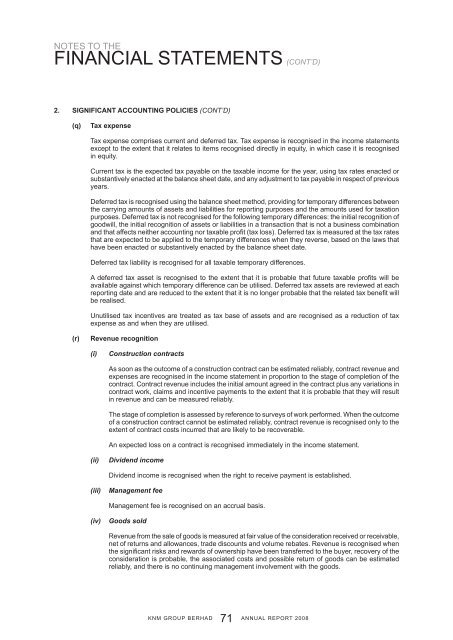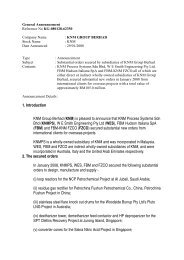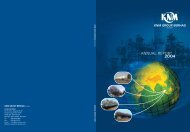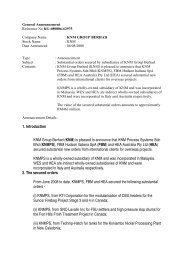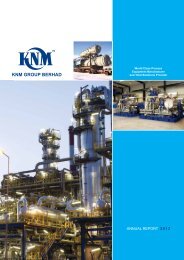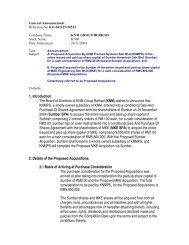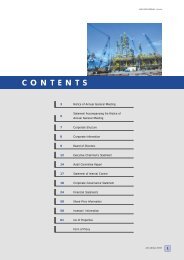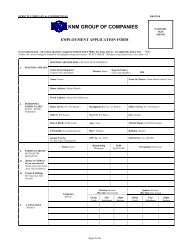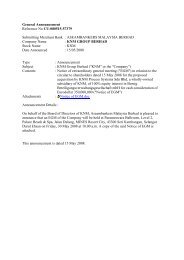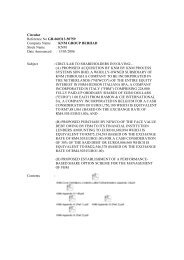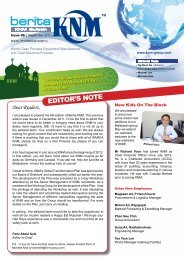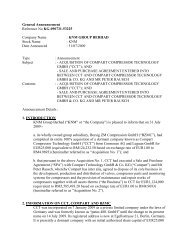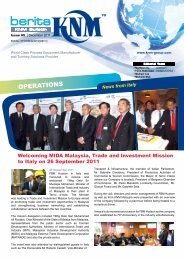ANNUAL REPORT 2008 - KNM Steel Sdn Bhd
ANNUAL REPORT 2008 - KNM Steel Sdn Bhd
ANNUAL REPORT 2008 - KNM Steel Sdn Bhd
You also want an ePaper? Increase the reach of your titles
YUMPU automatically turns print PDFs into web optimized ePapers that Google loves.
NOTES TO THE<br />
FINANCIAL STATEMENTS (CONT’D)<br />
2. Significant accounting policies (cont’d)<br />
(q)<br />
Tax expense<br />
Tax expense comprises current and deferred tax. Tax expense is recognised in the income statements<br />
except to the extent that it relates to items recognised directly in equity, in which case it is recognised<br />
in equity.<br />
Current tax is the expected tax payable on the taxable income for the year, using tax rates enacted or<br />
substantively enacted at the balance sheet date, and any adjustment to tax payable in respect of previous<br />
years.<br />
Deferred tax is recognised using the balance sheet method, providing for temporary differences between<br />
the carrying amounts of assets and liabilities for reporting purposes and the amounts used for taxation<br />
purposes. Deferred tax is not recognised for the following temporary differences: the initial recognition of<br />
goodwill, the initial recognition of assets or liabilities in a transaction that is not a business combination<br />
and that affects neither accounting nor taxable profit (tax loss). Deferred tax is measured at the tax rates<br />
that are expected to be applied to the temporary differences when they reverse, based on the laws that<br />
have been enacted or substantively enacted by the balance sheet date.<br />
Deferred tax liability is recognised for all taxable temporary differences.<br />
A deferred tax asset is recognised to the extent that it is probable that future taxable profits will be<br />
available against which temporary difference can be utilised. Deferred tax assets are reviewed at each<br />
reporting date and are reduced to the extent that it is no longer probable that the related tax benefit will<br />
be realised.<br />
Unutilised tax incentives are treated as tax base of assets and are recognised as a reduction of tax<br />
expense as and when they are utilised.<br />
(r)<br />
Revenue recognition<br />
(i)<br />
Construction contracts<br />
As soon as the outcome of a construction contract can be estimated reliably, contract revenue and<br />
expenses are recognised in the income statement in proportion to the stage of completion of the<br />
contract. Contract revenue includes the initial amount agreed in the contract plus any variations in<br />
contract work, claims and incentive payments to the extent that it is probable that they will result<br />
in revenue and can be measured reliably.<br />
The stage of completion is assessed by reference to surveys of work performed. When the outcome<br />
of a construction contract cannot be estimated reliably, contract revenue is recognised only to the<br />
extent of contract costs incurred that are likely to be recoverable.<br />
An expected loss on a contract is recognised immediately in the income statement.<br />
(ii)<br />
Dividend income<br />
Dividend income is recognised when the right to receive payment is established.<br />
(iii)<br />
Management fee<br />
Management fee is recognised on an accrual basis.<br />
(iv)<br />
Goods sold<br />
Revenue from the sale of goods is measured at fair value of the consideration received or receivable,<br />
net of returns and allowances, trade discounts and volume rebates. Revenue is recognised when<br />
the significant risks and rewards of ownership have been transferred to the buyer, recovery of the<br />
consideration is probable, the associated costs and possible return of goods can be estimated<br />
reliably, and there is no continuing management involvement with the goods.<br />
<strong>KNM</strong> GROUP BERHAD<br />
71<br />
<strong>ANNUAL</strong> <strong>REPORT</strong> <strong>2008</strong>


